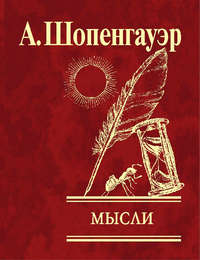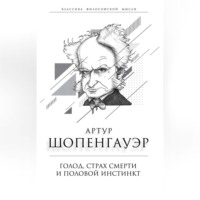 полная версия
полная версияThe World as Will and Idea (Vol. 2 of 3)
Further, it is really only in perception in the narrowest sense, that is, in sight, that in empirical apprehension the transition from the sensation to its cause takes place quite unconsciously. In every other kind of sense perception, on the contrary, the transition takes place with more or less distinct consciousness; therefore, in the case of apprehension through the four coarser senses, its reality is capable of being established as an immediate fact. Thus in the dark we feel a thing for a long time on all sides until from the different effects upon our hands we are able to construct its definite form as their cause. Further, if something feels smooth we sometimes reflect whether we may not have fat or oil upon our hands; and again, if something feels cold we ask ourselves whether it may not be that we have very warm hands. When we hear a sound we sometimes doubt whether it was really an affection of our sense of hearing from without or merely an inner affection of it; then whether it sounded near and weak or far off and strong, then from what direction it came, and finally whether it was the voice of a man or of a brute, or the sound of an instrument; thus we investigate the cause of each effect we experience. In the case of smell and taste uncertainty as to the objective nature of the cause of the effect felt is of the commonest occurrence, so distinctly are the two separated here. The fact that in sight the transition from the effect to the cause occurs quite unconsciously, and hence the illusion arises that this kind of perception is perfectly direct, and consists simply in the sensation alone without any operation of the understanding – this has its explanation partly in the great perfection of the organ of vision, and partly in the exclusively rectilineal action of light. On account of the latter circumstance the impression itself leads directly to the place of the cause, and since the eye is capable of perceiving with the greatest exactness and at a glance all the fine distinctions of light and shade, colour and outline, and also the data in accordance with which the understanding estimates distance, it thus happens that in the case of impressions of this sense the operation of the understanding takes place with such rapidity and certainty that we are just as little conscious of it as of spelling when we read. Hence arises the delusion that the sensation itself presents us directly with the objects. Yet it is just in sight that the operation of the understanding, consisting in the knowledge of the cause from the effect, is most significant. By means of it what is felt doubly, with two eyes, is perceived as single; by means of it the impression which strikes the retina upside down, in consequence of the crossing of the rays in the pupils, is put right by following back the cause of this in the same direction, or as we express ourselves, we see things upright although their image in the eye is reversed; and finally by means of the operation of the understanding magnitude and distance are estimated by us in direct perception from five different data, which are very clearly and beautifully described by Dr. Thomas Reid. I expounded all this, and also the proofs which irrefutably establish the intellectual nature of perception, as long ago as 1816, in my essay “On Sight and Colour” (second edition, 1854; third edition, 1870), and with important additions fifteen years later in the revised Latin version of it which is given under the title, “Theoria Colorum Physiologica Eademque Primaria,” in the third volume of the “Scriptores Ophthalmologici Minores,” published by Justus Radius in 1830; yet most fully and thoroughly in the second (and third) edition of my essay “On the Principle of Sufficient Reason,” § 21. Therefore on this important subject I refer to these works, so as not to extend unduly the present exposition.
On the other hand, an observation which trenches on the province of æsthetics may find its place here. It follows from the proved intellectual nature of perception that the sight of beautiful objects – for example, of a beautiful view – is also a phenomenon of the brain. Its purity and completeness, therefore, depends not merely on the object, but also upon the quality of the brain, its form and size, the fineness of its texture, and the stimulation of its activity by the strength of the pulse of the arteries which supply it. Accordingly the same view appears in different heads, even when the eyes are equally acute, as different as, for example, the first and last impressions of a copper plate that has been much used. This is the explanation of the difference of capacity for enjoying natural beauty, and consequently also for reproducing it, i. e., for occasioning a similar phenomenon of the brain by means of an entirely different kind of cause, the arrangement of colours on a canvas.
The apparent immediacy of perception, depending on its entire intellectuality, by virtue of which, as Euler says, we apprehend the thing itself, and as external to us, finds an analogy in the way in which we feel the parts of our own bodies, especially when they suffer pain, which when we do feel them is generally the case. Just as we imagine that we perceive things where they are, while the perception really takes place in the brain, we believe that we feel the pain of a limb in the limb itself, while in reality it also is felt in the brain, to which it is conducted by the nerve of the affected part. Therefore, only the affections of those parts whose nerves go to the brain are felt, and not those of the parts whose nerves belong to the sympathetic system, unless it be that an unusually strong affection of these parts penetrates by some roundabout way to the brain, where yet for the most part it only makes itself known as a dull sense of discomfort, and always without definite determination of its locality. Hence, also, it is that we do not feel injuries to a limb whose nerve-trunk has been severed or ligatured. And hence, finally, the man who has lost a limb still sometimes feels pain in it, because the nerves which go to the brain are still there. Thus, in the two phenomena here compared, what goes on in the brain is apprehended as outside of it; in the case of perception, by means of the understanding, which extends its feelers into the outer world; in the case of the feeling of our limbs, by means of the nerves.
Chapter III. On The Senses
It is not the object of my writings to repeat what has been said by others, and therefore I only make here some special remarks of my own on the subject of the senses.
The senses are merely the channels through which the brain receives from without (in the form of sensations) the materials which it works up into ideas of perception. Those sensations which principally serve for the objective comprehension of the external world must in themselves be neither agreeable nor disagreeable. This really means that they must leave the will entirely unaffected. Otherwise the sensation itself would attract our attention, and we would remain at the effect instead of passing to the cause, which is what is aimed at here. For it would bring with it that marked superiority, as regards our consideration, which the will always has over the mere idea, to which we only turn when the will is silent. Therefore colours and sounds are in themselves, and so long as their impression does not pass the normal degree, neither painful nor pleasurable sensations, but appear with the indifference that fits them to be the material of pure objective perception. This is as far the case as was possible in a body which is in itself through and through will; and just in this respect it is worthy of admiration. Physiologically it rests upon the fact that in the organs of the nobler senses, thus in sight and hearing, the nerves which have to receive the specific outward impression are quite insusceptible to any sensation of pain, and know no other sensation than that which is specifically peculiar to them, and which serves the purpose of mere apprehension. Thus the retina, as also the optic nerve, is insensible to every injury; and this is also the case with the nerve of hearing. In both organs pain is only felt in their other parts, the surroundings of the nerve of sense which is peculiar to them, never in this nerve itself. In the case of the eye such pain is felt principally in the conjunctiva; in the case of the ear, in the meatus auditorius. Even with the brain this is the case, for if it is cut into directly, thus from above, it has no feeling. Thus only on account of this indifference with regard to the will which is peculiar to them are the sensations of the eye capable of supplying the understanding with such multifarious and finely distinguished data, out of which it constructs in our head the marvellous objective world, by the application of the law of causality upon the foundation of the pure perceptions of space and time. Just that freedom from affecting the will which is characteristic of sensations of colour enables them, when their energy is heightened by transparency, as in the glow of an evening sky, in painted glass, and the like, to raise us very easily into the state of pure objective will-less perception, which, as I have shown in my third book, is one of the chief constituent elements of the æsthetic impression. Just this indifference with regard to the will fits sounds to supply the material for denoting the infinite multiplicity of the conceptions of the reason.
Outer sense, that is, receptivity for external impressions as pure data for the understanding, is divided into five senses, and these accommodate themselves to the four elements, i. e., the four states of aggregation, together with that of imponderability. Thus the sense for what is firm (earth) is touch; for what is fluid (water), taste; for what is in the form of vapour, i. e., volatile (vapour, exhalation), smell; for what is permanently elastic (air), hearing; for what is imponderable (fire, light), sight. The second imponderable, heat, is not properly an object of the senses, but of general feeling, and therefore always affects the will directly, as agreeable or disagreeable. From this classification there also follows the relative dignity of the senses. Sight has the highest rank, because its sphere is the widest and its susceptibility the finest. This rests upon the fact that what affects it is an imponderable, that is, something which is scarcely corporeal, but is quasi spiritual. Hearing has the second place, corresponding to air. However, touch is a more thorough and well-informed sense. For while each of the other senses gives us only an entirely one-sided relation to the object, as its sound, or its relation to light, touch, which is closely bound up with general feeling and muscular power, supplies the understanding with the data at once for the form, magnitude, hardness, softness, texture, firmness, temperature, and weight of bodies, and all this with the least possibility of illusion and deception, to which all the other senses are far more subject. The two lowest senses, smell and taste, are no longer free from a direct affection of the will, that is, they are always agreeably or disagreeably affected, and are therefore more subjective than objective.
Sensations of hearing are exclusively in time, and therefore the whole nature of music consists in degrees of time, upon which depends both the quality or pitch of tones, by means of vibrations, and also their quantity or duration, by means of time. The sensations of sight, on the other hand, are primarily and principally in space; but secondarily, by reason of their duration, they are also in time.
Sight is the sense of the understanding which perceives; hearing is the sense of the reason which thinks and apprehends. Words are only imperfectly represented by visible signs; and therefore I doubt whether a deaf and dumb man, who can read, but has no idea of the sound of the words, works as quickly in thinking with the mere visible signs of conceptions as we do with the real, i. e., the audible words. If he cannot read, it is well known that he is almost like an irrational animal, while the man born blind is from the first a thoroughly rational being.
Sight is an active, hearing a passive sense. Therefore sounds affect our mind in a disturbing and hostile manner, and indeed they do so the more in proportion as the mind is active and developed; they distract all thoughts and instantly destroy the power of thinking. On the other hand, there is no analogous disturbance through the eye, no direct effect of what is seen, as such, upon the activity of thought (for naturally we are not speaking here of the influence which the objects looked at have upon the will); but the most varied multitude of things before our eyes admits of entirely unhindered and quiet thought. Therefore the thinking mind lives at peace with the eye, but is always at war with the ear. This opposition of the two senses is also confirmed by the fact that if deaf and dumb persons are cured by galvanism they become deadly pale with terror at the first sounds they hear (Gilbert's “Annalen der Physik,” vol. x. p. 382), while blind persons, on the contrary, who have been operated upon, behold with ecstasy the first light, and unwillingly allow the bandages to be put over their eyes again. All that has been said, however, can be explained from the fact that hearing takes place by means of a mechanical vibration of the nerve of hearing which is at once transmitted to the brain, while seeing, on the other hand, is a real action of the retina which is merely stimulated and called forth by light and its modifications; as I have shown at length in my physiological theory of colours. But this whole opposition stands in direct conflict with that coloured-ether, drum-beating theory which is now everywhere unblushingly served up, and which seeks to degrade the eye's sensation of light to a mechanical vibration, such as primarily that of hearing actually is, while nothing can be more different than the still, gentle effect of light and the alarm-drum of hearing. If we add to this the remarkable circumstance that although we hear with two ears, the sensibility of which is often very different, yet we never hear a sound double, as we often see things double with our two eyes, we are led to the conjecture that the sensation of hearing does not arise in the labyrinth or in the cochlea, but deep in the brain where the two nerves of hearing meet, and thus the impression becomes simple. But this is where the pons Varolii encloses the medulla oblongata, thus at the absolutely lethal spot, by the injury of which every animal is instantly killed, and from which the nerve of hearing has only a short course to the labyrinth, the seat of acoustic vibration. Now it is just because its source is here, in this dangerous place, in which also all movement of the limbs originates, that we start at a sudden noise; which does not occur in the least degree when we suddenly see a light; for example, a flash of lightning. The optic nerve, on the contrary, proceeds from its thalami much further forward (though perhaps its source lies behind them), and throughout its course is covered by the anterior lobes of the brain, although always separated from them till, having extended quite out of the brain, it is spread out in the retina, upon which, on stimulation by light, the sensation first arises, and where it is really localised. This is shown in my essay upon sight and colour. This origin of the auditory nerve explains, then, the great disturbance which the power of thinking suffers from sound, on account of which thinking men, and in general all people of much intellect, are without exception absolutely incapable of enduring any noise. For it disturbs the constant stream of their thoughts, interrupts and paralyses their thinking, just because the vibration of the auditory nerve extends so deep into the brain, the whole mass of which feels the oscillations set up through this nerve, and vibrates along with them, and because the brains of such persons are more easily moved than those of ordinary men. On the same readiness to be set in motion, and capacity for transmission, which characterises their brains depends the fact that in the case of persons like these every thought calls forth so readily all those analogous or related to it whereby the similarities, analogies, and relations of things in general come so quickly and easily into their minds; that the same occasion which millions of ordinary minds have experienced before brings them to the thought, to the discovery, that other people are subsequently surprised they did not reach themselves, for they certainly can think afterwards, but they cannot think before. Thus the sun shone on all statues, but only the statue of Memnon gave forth a sound. For this reason Kant, Gœthe, and Jean Paul were highly sensitive to every noise, as their biographers bear witness.13 Gœthe in his last years bought a house which had fallen into disrepair close to his own, simply in order that he might not have to endure the noise that would be made in repairing it. Thus it was in vain that in his youth he followed the drum in order to harden himself against noise. It is not a matter of custom. On the other hand, the truly stoical indifference to noise of ordinary minds is astonishing. No noise disturbs them in their thinking, reading, writing, or other occupations, while the finer mind is rendered quite incapable by it. But just that which makes them so insensible to noise of every kind makes them also insensible to the beautiful in plastic art, and to deep thought or fine expression in literary art; in short, to all that does not touch their personal interests. The following remark of Lichtenberg's applies to the paralysing effect which noise has upon highly intellectual persons: “It is always a good sign when an artist can be hindered by trifles from exercising his art. F – used to stick his fingers into sulphur if he wished to play the piano… Such things do not interfere with the average mind;… it acts like a coarse sieve” (Vermischte Schriften, vol. i. p. 398). I have long really held the opinion that the amount of noise which any one can bear undisturbed stands in inverse proportion to his mental capacity, and therefore may be regarded as a pretty fair measure of it. Therefore, if I hear the dogs barking for hours together in the court of a house without being stopped, I know what to think of the intellectual capacity of the inhabitants. The man who habitually slams the door of a room, instead of shutting it with his hand, or allows this to go on in his house, is not only ill-bred, but is also a coarse and dull-minded fellow. That in English “sensible” also means gifted with understanding is based upon accurate and fine observation. We shall only become quite civilised when the ears are no longer unprotected, and when it shall no longer be the right of everybody to sever the consciousness of each thinking being, in its course of a thousand steps, with whistling, howling, bellowing, hammering, whip-cracking, barking, &c. &c. The Sybarites banished all noisy trades without the town; the honourable sect of the Shakers in North America permit no unnecessary noise in their villages, and the Moravians have a similar rule. Something more is said upon this subject in the thirtieth chapter of the second volume of the “Parerga.”
The effect of music upon the mind, so penetrating, so direct, so unfailing, may be explained from the passive nature of hearing which has been discussed; also the after effect which sometimes follows it, and which consists in a specially elevated frame of mind. The vibrations of the tones following in rationally combined numerical relations set the fibre of the brain itself in similar vibration. On the other hand, the active nature of sight, opposed as it is to the passive nature of hearing, makes it intelligible why there can be nothing analogous to music for the eye, and the piano of colours was an absurd mistake. Further, it is just on account of the active nature of the sense of sight that it is remarkably acute in the case of beasts that hunt, i. e., beasts of prey, while conversely the passive sense of hearing is specially acute in those beasts that are hunted, that flee, and are timid, so that it may give them timely warning of the pursuer that is rushing or creeping upon them.
Just as we have recognised in sight the sense of the understanding, and in hearing the sense of the reason, so we might call smell the sense of the memory, because it recalls to us more directly than any other the specific impression of an event or a scene even from the most distant past.
Chapter IV. On Knowledge A Priori
From the fact that we are able spontaneously to assign and determine the laws of relations in space without having recourse to experience, Plato concludes (Meno, p. 353, Bip.) that all learning is mere recollection. Kant, on the other hand, concludes that space is subjectively conditioned, and merely a form of the faculty of knowledge. How far, in this regard, does Kant stand above Plato!
Cogito, ergo sum, is an analytical judgment. Indeed Parmenides held it to be an identical judgment: “το γαρ αυτο νοειν εστι τε και ειναι” (nam intelligere et esse idem est, Clem. Alex. Strom., vi. 2, § 23). As such, however, or indeed even as an analytical judgment, it cannot contain any special wisdom; nor yet if, to go still deeper, we seek to deduce it as a conclusion from the major premise, non-entis nulla sunt prædicata. But with this proposition what Descartes really wished to express was the great truth that immediate certainty belongs only to self-consciousness, to what is subjective. To what is objective, on the other hand, thus to everything else, only indirect certainty belongs; for it is arrived at through self-consciousness; and being thus merely at second hand, it is to be regarded as problematical. Upon this depends the value of this celebrated proposition. As its opposite we may set up, in the sense of the Kantian philosophy, cogito, ergo est, that is, exactly as I think certain relations in things (the mathematical), they must always occur in all possible experience; – this was an important, profound, and a late apperçu, which appeared in the form of the problem as to the possibility of synthetic judgments a priori, and has actually opened up the way to a deeper knowledge. This problem is the watchword of the Kantian philosophy, as the former proposition is that of the Cartesian, and shows εξ οἱων εισ οἱα.
Kant very fitly places his investigations concerning time and space at the head of all the rest. For to the speculative mind these questions present themselves before all others: what is time? – what is this that consists of mere movement, without anything that moves it? – and what is space? this omnipresent nothing, out of which nothing that exists can escape without ceasing to be anything at all?
That time and space depend on the subject, are the mode in which the process of objective apperception is brought about in the brain, has already a sufficient proof in the absolute impossibility of thinking away time and space, while we can very easily think away everything that is presented in them. The hand can leave go of everything except itself. However, I wish here to illustrate by a few examples and deductions the more exact proofs of this truth which are given by Kant, not for the purpose of refuting stupid objections, but for the use of those who may have to expound Kant's doctrine in future.
“A right-angled equilateral triangle” contains no logical contradiction; for the predicates do not by any means cancel the subject, nor are they inconsistent with each other. It is only when their object is constructed in pure perception that the impossibility of their union in it appears. Now if on this account we were to regard this as a contradiction, then so would every physical impossibility, only discovered to be such after the lapse of centuries, be a contradiction; for example, the composition of a metal from its elements, or a mammal with more or fewer than seven cervical vertebra,14 or horns and upper incisors in the same animal. But only logical impossibility is a contradiction, not physical, and just as little mathematical. Equilateral and rectangled do not contradict each other (they coexist in the square), nor does either of them contradict a triangle. Therefore the incompatibility of the above conceptions can never be known by mere thinking, but is only discovered by perception – merely mental perception, however, which requires no experience, no real object. We should also refer here to the proposition of Giordano Bruno, which is also found in Aristotle: “An infinitely large body is necessarily immovable” – a proposition which cannot rest either upon experience or upon the principle of contradiction, since it speaks of things which cannot occur in any experience, and the conceptions “infinitely large” and “movable” do not contradict each other; but it is only pure perception that informs us that motion demands a space outside the body, while its infinite size leaves no space over. Suppose, now, it should be objected to the first mathematical example that it is only a question of how complete a conception of a triangle the person judging has: if the conception is quite complete it will also contain the impossibility of a triangle being rectangular and also equilateral. The answer to this is: assume that his conception is not so complete, yet without recourse to experience he can, by the mere construction of the triangle in his imagination, extend his conception of it and convince himself for ever of the impossibility of this combination of these conceptions. This process, however, is a synthetic judgment a priori, that is, a judgment through which, independently of all experience, and yet with validity for all experience, we form and perfect our conceptions. For, in general, whether a given judgment is analytical or synthetical can only be determined in the particular case according as the conception of the subject in the mind of the person judging is more or less complete. The conception “cat” contains in the mind of a Cuvier a hundred times more than in that of his servant; therefore the same judgments about it will be synthetical for the latter, and only analytical for the former. But if we take the conceptions objectively, and now wish to decide whether a given judgment is analytical or synthetical, we must change the predicate into its contradictory opposite, and apply this to the subject without a copula. If this gives a contradictio in adjecto, then the judgment was analytical; otherwise it was synthetical.









